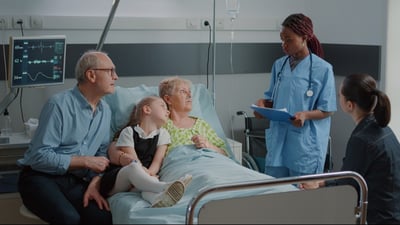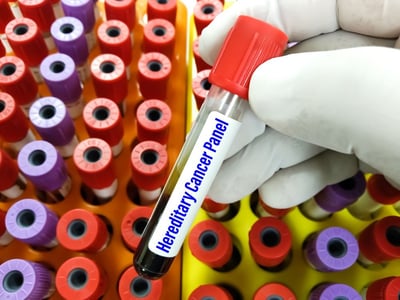Colorectal Cancer



Relevance: Medium-High
Most relevant for: People with cancer interested in using cannabis to help manage symptoms.
Study: Use of cannabis for cancer symptom management
Among people with cancer, interest in the use of cannabis to manage cancer symptoms and treatment side effects is high. The world's leading professional organization of oncologists has published strategies to help adults with cancer and their healthcare providers have open, nonjudgmental discussions about the use of cannabis to manage cancer symptoms. (Posted 9/27/24)
Este artículo está disponible en español.
READ MORE ›


Relevance: Medium-High
Most relevant for: People with Lynch syndrome and people with colorectal cancer who may have Lynch syndrome
Study: Colorectal cancer in people with Lynch syndrome can include types of cancer found more typically in people without Lynch syndrome
When people with Lynch syndrome (LS) develop cancer, their tumors typically have a related set of features or biomarkers known as deficient mismatch repair (dMMR) and high microsatellite instability (MSI-High). However, occasionally people with Lynch syndrome have cancers that are proficient in mismatch repair (pMMR or MMR-P) and have microsatellite stability (MSS or MSI-Low) –more like the colorectal cancers found in people without Lynch syndrome. This study shows that 10 percent of people with Lynch syndrome may have these types of cancers. This can change treatment recommendations. (Posted 9/5/24)
Este artículo está disponible en español.
READ MORE ›


Relevance: High
Most relevant for: People diagnosed with cancer
Topic: Acupressure for cancer symptom relief
Acupressure is a safe treatment that can be used to relieve some symptoms of cancer and side effects of treatment. Light pressure applied to key points on the body may help with fatigue, sleep, nausea and possibly other symptoms as well. (Posted 8/1/24)
Este artículo está disponible en español.
READ MORE ›


Relevance: Medium-High
Most relevant for: People with advanced HER2-positive cancer
Topic: The drug Enhertu is FDA-approved for any advanced or metastatic HER2-positive tumors
The FDA granted accelerated approval of Enhertu for people with any HER2-positive tumor that is metastatic or cannot be surgically removed. Eligible patients must have had previous treatment such as chemotherapy or hormone therapy. (Posted 7/19/24)
Este artículo está disponible en español.
READ MORE ›


Relevance: Medium-High
Most relevant for: Cancer patients
Topic: Experts call for early palliative care for cancer patients
People with cancer need support and care not only at the end of life but from the time of diagnosis. At the 2024 American Society of Clinical Oncology (ASCO) annual meeting, the organization’s president urged cancer healthcare professionals to make palliative care central to cancer treatment. (Posted 7/17/24)
Este artículo está disponible en español.
READ MORE ›


Relevance: Medium
Most relevant for: People with Li-Fraumeni syndrome
Personal Story: Living a full life with Li-Fraumeni syndrome
This XRAY review is about a five-time cancer survivor who has an inherited mutation in the TP53 gene. People with inherited mutations in TP53 have Li-Fraumeni syndrome, which is linked to a very high lifetime risk for many types of cancer. Here we share his inspiring story and provide more information on Li-Fraumeni syndrome. (Posted 4/16/24)
Este artículo está disponible en español.
READ MORE ›


Relevance: Medium-High
Most relevant for: People with colorectal cancer
Update: News from the FDA - Two new metastatic colorectal cancer treatments
The FDA recently approved two new treatments for metastatic colorectal cancer. (Posted 3/22/24)
Este artículo está disponible en español.
READ MORE ›


Relevance: High
Most relevant for: People diagnosed with cancer who have not yet had genetic testing
Study: Genetic testing among people with cancer can find mutations that may affect treatment and prevention
Despite national guidelines recommending genetic testing, less than 10 percent of eligible patients had genetic testing within two years after their cancer diagnosis. Among those who had testing, 10-30 percent had an inherited mutation that could affect their medical care. (Posted 3/15/2024)
Este artículo está disponible en español.
READ MORE ›


Relevance: Medium-High
Most relevant for: Young adults
Article: Red flags for colorectal cancer in young adults
The rate of colorectal cancer in young adults has been increasing. Researchers in this study identified four signs or “red flags” for colorectal cancer before age 50 (considered to be early onset colorectal cancer). Recognizing these red flags can help diagnose and treat colorectal cancer earlier. (Posted 10/23/23)
Este artículo está disponible en español.
READ MORE ›


Relevance: High
Most relevant for: People interested in genetic testing.
Article: Genetic testing and the future of medicine
An article published in Katie Couric Media discusses genetic testing and how it can impact health. The author talked with Dr. Robert Steiner, a doctor who specializes in genetics. He talked about genetic testing and how the results can affect health and change lives. (Posted 9/28/23)
Este artículo está disponible en español.
READ MORE ›